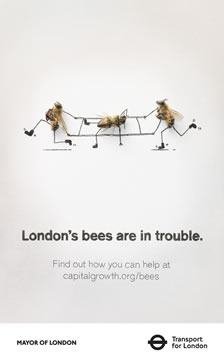Bee Keepers At Roehampton University Wins Award
Mayor calls on Londoners to pledge 'bee-friendly' behaviour to support urban bees
The university was one of fifty winners of community bee-keeping training, hives and bees announced as part of Capital Growth .In addition, the Mayor has announced the winners of the Capital Growth bee competition to create 50 community hives. Groups are attending bee-training sessions before being given hives, equipment and a spring bee colony next year. Training ranges from classroom-based including specifics on urban beekeeping and equipment knowledge, to the practical, such as hands-on experience of making honey and siting or building hives. The 50 organisations to receive hives span 22 London boroughs (listed below) and each is expected to act as 'bee-friendly' ambassadors to help spread a love of bees and knowledge of urban bee-friendly behaviour. The organisations include schools, universities, housing estates, a synagogue and even a cemetery.
Bees are a vital part of our ecosystem - they pollinate at least 30 percent of the food crops we consume. They are directly responsible for the growth of many fruits, vegetables, live-stock feed and even cotton for fabrics. One in three mouthfuls of the food we eat is dependent on pollination. Furthermore, bee and insect pollination contributes around £430m a year to the economy. In the winter of 2009/2010 alone, Britain lost a shocking third of its bee colonies. Due to the milder climate, more diverse forage and more controlled use of agricultural chemicals, large cities are becoming havens for bee populations.
 Award-winning creative team LIDA, part of M&C Saatchi, have redesigned original artwork by cult artist Magnus Muhr, known for his imagery of dead flies. The eye-catching campaign instead uses images of dead bee and simple line drawings to highlight the plight of London’s bee population. The artwork shows bees on a drip, on a stretcher and in a hospital bed. The 'bee-movies' show bees taking part in everyday London-based adventures which put them in peril, such as cleaning a window or travelling on the Tube.
Award-winning creative team LIDA, part of M&C Saatchi, have redesigned original artwork by cult artist Magnus Muhr, known for his imagery of dead flies. The eye-catching campaign instead uses images of dead bee and simple line drawings to highlight the plight of London’s bee population. The artwork shows bees on a drip, on a stretcher and in a hospital bed. The 'bee-movies' show bees taking part in everyday London-based adventures which put them in peril, such as cleaning a window or travelling on the Tube.
These visuals will take the form of striking billboards appearing across the London Underground network from Friday June 17 and humorous video clips with a serious message, which are hoped to go viral across the internet. Screensavers and desktop images will also be available for download. This creative design work by a world-class agency has been done on a pro-bono (no cost) basis .
The aim of the campaign is to encourage Londoners and organisations to come to the rescue of bees. People can visit the Capital Growth website www.capitalgrowth.org/bees/ to find out why bees are essential to life as we know it and to pledge their dedication to help London’s bee population thrive. Organisations from the Co-op to the Women’s Institute and t he Soil Association have also pledged support.
Pledges can be personalised but suggested bee-friendly behaviours include growing your own bee-friendly food including fruit trees, tomatoes and soft fruits, shopping for bee-friendly foods such as locally sourced honey and choosing bee-friendly gardening by minimising use of pesticides.
Boris Johnson, Mayor of London, said:
'I want London to boast a great quality of life making it an attractive place to live, work and visit. Protection of our environment is an important part of this. My 'bee-friendly' pledge as Mayor is to zealously safeguard our city's green spaces. Through Capital Growth, we aim to create 2012 community food growing spaces in London by 2012 which will provide nectar-rich plants for bees. As part of this, we are supporting the development of 50 new community bee hives across London to create sanctuaries for the urban bee.'
Rosie Boycott, Chair of London Food, said:
'The Capital Growth project has kick-started a “Grow your Own” revolution with the creation of over 1000 new community food growing spaces in London. The crops which are being planted need bees for pollination so now is the perfect time to adopt bee-friendly behaviours. We are honoured that LIDA, part of M&C Saatchi has helped us at no cost to develop such a world-class campaign to spread our message.'
Mikey Tomkins, London Food Link, said:
'With more people unable to find allotments, many are looking for alternative spaces to produce food. To do this it is vital to protect our local pollinators. Honey bees in particular are crucial as they are the main pollinator people can manage, yet the number of bee hives in use is in decline in the UK. This is one of the reasons why Capital Bee is helping to train 50 community beekeepers in the capital.'
Capital Bee is part of Capital Growth, a partnership initiative between London Food Link, the Mayor of London Boris Johnson, and the Big Lottery's Local Food Fund. It aims to boost community food growing, creating 2,012 new food growing spaces by the end of 2012. There are now 1000 plots already up and running in a diverse range of places, such as schools, by railways, on housing estates and on roofs.
June 13, 2011